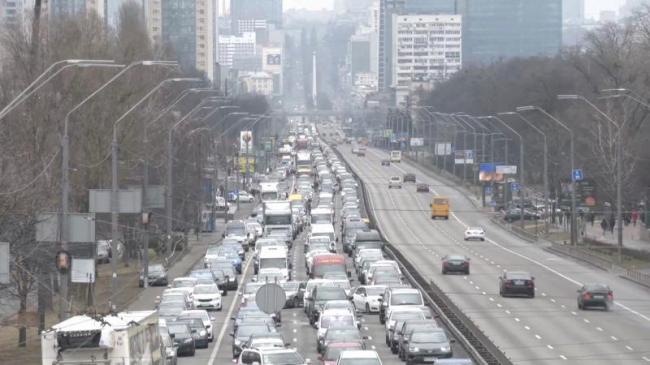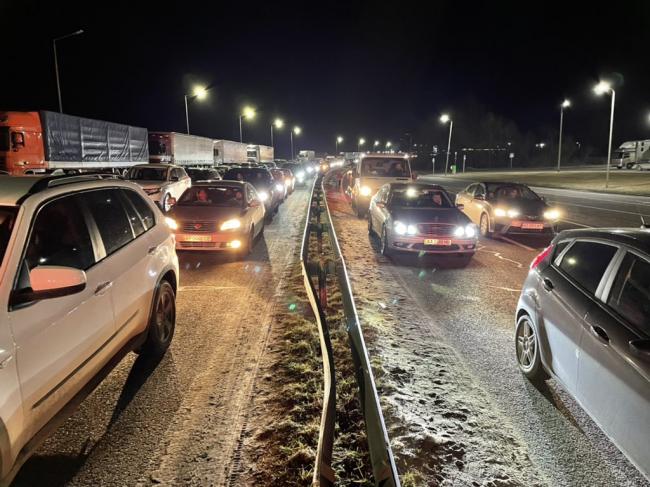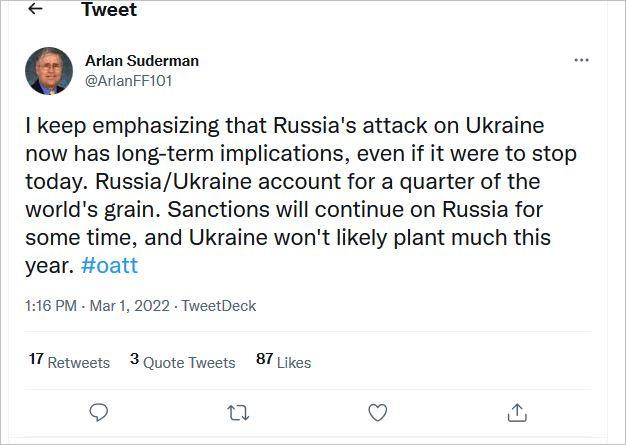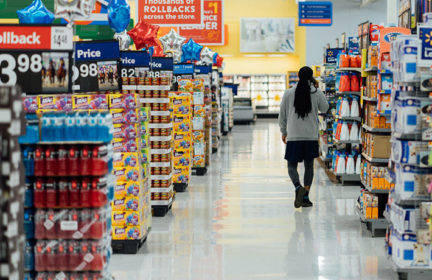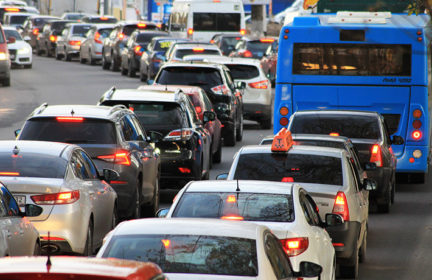What can we learn from the war in Ukraine?
One of the main lessons I’ve seen so far is the need to reassess my bug out plan. There was a 6 mile (10km) long traffic jam of refugees fleeing to Poland.
At what point do you abandon your vehicle and trek it on foot? Is going on foot any better?
Another thought I had was having enough water, food, and fuel on hand. You don’t want to run out of food during the middle of an invasion and try to go through a war zone to buy groceries.
My heart goes out to all those affected. Even to the Russian soldiers who may not like what they are doing but have to.
Let’s learn from what is going on and prepare for the future.
-
Comments (32)
-
Cia - February 25, 2022
I would only abandon my car if there were a tsunami coming. Poland has accepted tens of thousands of Uk refugees. Germany and the EU have said they’ll help. Sweden said it wouldn’t. I don’t know whether from refugee fatigue or reluctance to offend Putin. Men between 18 and 60 are forbidden to leave the Uk.
I think we’re safe from anything similar happening here. For reasons of war. I think hurricanes, wildfires, earthquakes, floods, would be the most we might have to evacuate for.
-
Seasons4 - February 26, 2022
My heart also goes out to the people of Ukraine. One big takeaway for me has been the strength of the “normalcy bias.” Based on my very limited understanding of the political situation, Ukraine has been in jeopardy since at least 2014. Yet up until the night before the invasion, some people couldn’t believe it would happen.
The unthinkable happened there. If the unthinkable happened here, is there anything else that I could do to prepare? In recent days, I’ve visited the Ready.gov and Red Cross websites and checked out the sections on hazards that I formerly discounted as very unlikely to ever happen. However, I live in a town where small combat ships are being built for the Navy and where LNG transport barges are being built. It’s not entirely inconceivable . . .
I’m rethinking how I set up my unfinished basement. One of the websites mentioned above said some people might have to shelter in place for up to a month, depending, of course.
-
Essie Carroll - February 26, 2022
That’s what I have heard as well, that troops have been slowly building up around the boarder of Ukraine for years and only recently built up more. I too would probably fall into the normalcy bias in that situation.
Makes me also wonder what dangers are building up around my boarder that I am totally ignoring and seeing as normal because of how slowly they are growing.
-
-
lonewolf - February 26, 2022
A wise man said to me a long time ago that the time to bug out is before the masses do, if you go early you can always come back, if you go too late-when everyone else does- you probably wont make it out in time.
bug out routes should be checked before anything happens and you should have multiple routes in case one is blocked.
-
LNMOt - March 4, 2022
I fully agree – my big take away from this situation has been to be more aware of leaving early. Don’t second guess yourself. Don’t wait until the last minute. It’s so true – if you find you’ve “over-reacted” and nothing happens, you can always come back. But the opposite is not always true.
-
TheFuries - April 18, 2022
This is what happened for my family. Twice. Once during WWII and it saved our family from the Holocaust. The second time when my mother and I fled during Communism in former Eastern Europe.
Always have a valid passport and documents. Have good friends in several countries. Even better if they’re the kinds of friends you can depend on to sponsor your asylum case if needed. And it goes both ways. Be that kind of friend.
When we fled, we didn’t know when we’d get the call that our window to go was open. The call came and our bags and papers were ready. Everything sold and our feet out the door. And be prepared for the trauma that follows – leaving a homeland, a country, a place can tear you into two, into before and after. Be prepared that you may never return to your homeland and it will only continue in an imagined, more idealized space.
There are too many valid reasons why people need flee to ignore it could happen to them. Everything boomerangs.
-
-
sewknot - February 26, 2022
Things I’ve learned from the news reports & interviews
1 have your documents ready – passport/visa/birth certificates
2 cash – have cash on hand so you don’t have to queue at the atm when you could be on the road
3 have your bag packed! Reports of people waking up at 3 am to missile strikes and deciding to pack THEN
4 your journey will take longer than you expect – make sure you have everything you need to make it to your destination and leave as soon as you can
5 mental fortitude – plan for the worst hope for the best
-
Essie Carroll - February 26, 2022
I really should get my documents ready and a bug out bag packed with the essentials for a possible quick getaway
-
Conrad B - February 26, 2022
Having your tip number four in mind of expecting it to take longer than you think is a good one. I try and implement that in my daily life and leave earlier than the GPS tells me to. Traffic, accidents, or weather can slow down a journey significantly. And if I get to my destination early, then I have a few minutes to relax.
-
-
Essie Carroll - February 26, 2022
Have your gas tank full and an extra can ready. Be able to flee the area you are in without having to stop for gas.
-
Carlotta SusannaStaff - February 26, 2022
Great question. I’ve learned that the time to make sure you have your preps ready (either for bugging in or out) is well before anything happens (i.e. when Putin was first amassing soldiers at the border). Even more important if you have children, pets, or care for elderly people. And if you have children or pets and you choose to bug out, you need to do it before everyone does.
P.S. I hope you don’t mind I slightly amended the title. Ukraine is not called “the Ukraine” anymore. It was referred to as “the Ukraine” when it was part of the Soviet Union, but since its independence, they’ve discouraged the use of “the”. Too many words on a pet peeve of mine, but since Ukraine is a sovereign nation, I think it matters.
-
Conrad B - February 26, 2022
Oh thank you for the correction! I didn’t know that. Thank you also for sharing the tip of bugging out early.
-
-
wildfireexpert - February 26, 2022
CNN had a live interview yesterday with a city council member. She had posted a photo of herself holding a kalashnikov rifle on her facebook page. She stated that the Kyiv city leaders had been meeting for days about Russia, then said something I found shocking, “If you would have asked me 3 days ago if I would be carrying a gun and learning to shoot it at another human being, I would have said you were crazy!”. She was a government insider discussing a possible invasion and was STILL overcome by the normalcy bias.
I wish her and her family and all in Ukraine the mental fortitude to withstand the uncertainty about their home and future.
And OP Conrad, depending on location, there may only be 1 or 2 ways out of an emergency situation. I live in a rural area vulnerable to wildfires and have pre-prepared (if that’s a word) my mental willingness to dismantle gates or fences, drive through them if necessary and take alternatives and risk damage to my car if needed. I’m not getting stuck behind cars that can’t think beyond “this is the road”.
-
Carlotta SusannaStaff - February 26, 2022
FYI Here’s a blog post about Israeli home shelters I thought you folks would be interested in:
A look at how Israelis build shelters for random missile attacks.
-
Gideon ParkerStaff - February 26, 2022
The video clip shows Ukrainian citizens working together to make obstacles to immobilize tanks and transport vehicles and homemade incendiary devices to fight back with.
Be prepared to work together with your neighbors, have resources to fight back, and be creative to make some if you don’t have any.
-
Pops - March 1, 2022
A couple of things to note, US-centric but applicable to everyone:
1) BP and Shell are both ending partnerships in RU oil fields. In addition to the other economic sanctions there will be short and long term impacts on oil and gas, and not just in EU. Don’t forget that the US now is exporting all the oil, gas and fuels we possibly can— like there is no tomorrow (a self fulfilling prophecy if there is one) so we no longer have shielding from the world market price.
2) Russia is the world’s number one grain exporter and Ukraine is no. 6. Again, the US is also an exporter, no. 2 at about 60% of RU total. Even with a big crop failure I doubt we’d starve in a year, but prices will rise and there could be temporary shortages as supply chains work into kinks.
3) Likewise RU is also the largest exporter of fertilizer, the US exports about half as much, but any slump in RU exports will raise prices world wide, and of course impact crop yields here and everywhere.
4) On a different note, US retail sale were probably up in february even after considering inflation so don’t expect prices to ease or products to always be on the shelves.
Finally, oil production globally is having a hard time catching up to returned demand. OPEC is not even able to pump to their own quota and the US tight oil glut is now down to just one region able to increase output.
Personally, I’m not prepping for an invasion but I do have the pantry as full as it has ever been. We live in the most connected world there ever was, globalism is a fact. Everything comes from somewhere else, and we are at the mercy of huge corporate monopolies, government shenanigans. Our bias toward normality can get us in trouble. Don’t underestimate the pain from simple glitches in normal life, like budget busting food prices, product shortages, fuel lines— yes right here. My granddaughter had a real problem finding baby formula last week after a recall.
I’ve also just invested in some 48v lithium batteries (LiFePo4), the price is best-ever at certain outlets, and with the push to electrification and intermittent generation I think raw materials (like the Russia/China pact will certainly try to corner) will only rise. It is mostly a backup power supply for now, I’ll eventually add more PV. (LG the no.1 panel maker just said they quit because of high materials costs).
-
Conrad B - March 1, 2022
Why is the US exporting all of the oil, gas, and fuel it can? Then we just turn around and import it from other countries as well. Doesn’t it make sense to just what we make, store some extra for a rainy day, and export any excess?
It does sound like we use quite a lot of Russian made goods, but at the same time we too make a lot here and export it out. Again, use what we make here and import if we need to fill the gap of what we aren’t able to make.
Thank you for the information and possible impact things will bring for us.
-
iowa guy - March 1, 2022
I’m no expert on oil exports – imports , but I think some lower quality oil is refined into things like diesel fuel, and higher quality oil – gasoline.
So when you see someone on the news say “all we need is to restart this pipeline”, well…
Someone here is probably sharper than I on fuel issues.
I’m a farmer . As pops says on grain, I don’t know if we’ll run out , but I’ve never seen anything like this in all my years of farming.
We already have big crop problems in South America. Western grain belt in the states is in drought, but that can change before spring. World grain stocks are at an all time low I think. Ag is is suffering supply chain issues in Fertilizer, chemicals, tires, repair parts, etc. I had to change to a different corn variety recently , because it wasn’t going to make it here in time (seed companies have global operations).
The wheels aren’t coming off yet, but even with higher grain prices, input costs have sky rocketed over last year, so who knows about next year…
If you browse around the agriculture websites, traders in grain and fertilizer, there is a lot more info to be had.
-
Conrad B - March 1, 2022
I know 0.003% about world oil trade, so I agree with you that others know much more than I do. Thanks for pitching in your thoughts and ideas. Differing qualities of petroleum makes sense.
-
Pops - March 2, 2022
Not to get too oil-nerdy but the kind of oil wells we think of, the big gusher that pumps oil for decades, were into oil reservoirs that trapped oil on its way floating to the surface. Those huge deposits are of course depleting daily and declining—and we aren’t finding enough more. The “new” oil that comes with horizontal drilling and hydro-fracturing the rock that caused the glut in the teens (and prompted allowing exports again) is not the same. Those wells are releasing the last of the oil trapped in the source rock where it formed.
This oil is very “light” or thin, it’s informally called Light, Tight Oil (LTO) and it isn’t what our refineries were made for. Turns out Canada has a bunch of oil deposits where the light part evaporated leaving what is exactly the same thing as asphalt. This tar is mixed with sand so they burn huge amounts of nat gas to make steam to wash the sand and collect the muck.
When the water is removed this tar is still too thick to flow soooo, we pipe LTO north to mix with the tar to make it thin enough to ship back down to Louisiana and refine.
We actually are about a net zero importer, but the last 10 year the LTO fracking biz has lost hundreds of billions in investor’s money. You can imagine just from that quick description that this deal is not going to make as much money, and use lots more of the very energy they’re trying to make as the old fashioned straight vertical well into a huge pressurized reservoirs.
Upshot is, this all indicates cheap oil won’t always be around. Expect more conflict, because oil is the master resource.
-
iowa guy - March 1, 2022
quality post
-
-
sewknot - March 2, 2022
As an interesting aside, a work colleague told me on Monday that she and her boyfriend had ‘prepped’ over the weekend. Gone to the store and bought a pile of tinned foods and apparently wasn’t alone, which explained the empty shelves I was seeing.
I found this interesting because she had previously mentioned thinking about food storage about 6 months ago, wondering aloud how much to store, at which point I think she was shocked when I casually said ‘minimum 2 weeks at home and 3 days to evacuate’!!
It took a severe storm, power cut, mains water burst AND the threat of war in Europe for her to finally start taking steps towards preparedness but equally I’m glad she has.
-
Olly Wright - March 2, 2022
Hey, at least they finally did something about it. Maybe they’ll see it’s not too bad and catch the preppin bug.
I am sure there are many areas of my life probably car maintenance where more experienced people are rolling their eyes at me and wanting to scream “Why don’t you do this!?”.
-
-
Lindsey - March 3, 2022
Interesting that you ask “at what point do you abandon your vehicle?” I have wondered this every time I see long lines of people evacuating, from Ukraine to wildfire evacuations.
Is there a time to consider an alternate form of transport? For example, although the car can carry more stuff, we have several bicycles optimized for urban exploration or gravel riding. I have wondered if there is an evacuation in our area (a midsize city), would it be faster to use our bicycles instead? They take up less space than a car and are generally more nimble as well as having the advantage of being able to take routes that are sometimes more direct (cutting through neighborhoods vs. having to drive around them) than what we could accomplish with our car. However, we will never be able to go as far as fast with fully-loaded bicycles vs. a car.
-
iowa guy - March 3, 2022
I live in a pretty low population area , so I probably can’t offer the best advice.
I’m already at my bug out location unless I am traveling.
But we have dirt bikes that might be better able to navigate traffic issues, and carry more supplies. we also have an atv with a box for hauling stuff.
-
Cia - March 3, 2022
I think it would depend on the emergency. It looks as though those who are willing to wait for a long time in their cars at the borders to Romania, Poland, etc, are eventually let in and accommodated as refugees. And they’d have what they were able to pack in their cars. You’d have to look at pile ups to decide what was safest for getting away from a wildfire. In most cases, a car would be better and faster.
-
-
iowa guy - March 3, 2022
Well, even some of the most cautious – conservative grain commentators are nervous, from U of Illinois . They are calling for tilling up conservation acres in the states and Europe.
Iowa PBS has an ag market show with various grain marketers on each week. One of the recent ones has been wildly bullish (higher prices ) for several months.
She also speaks to the “just in time” supply chain issues that have gotten us where we are.
Macro policy issues…
https://www.iowapbs.org/mtom/story/40069/market-plus-sue-martin
-
pnwsarahContributor - March 4, 2022
Earlier this week (2/28) the It Could Happen Here podcast (which I learned about on this forum) featured an interview with a guy who had to walk out of Ukraine. It was really interesting (and awful) and changed my perspective on preparedness. You all might want to give it a listen, too.
I’ve always tended my BOB carefully, but I had a hard time envisioning a scenario in which I’d do anything other than (1) use it while bugging in, (2) use it to get the essentials out of my house if it is structurally compromised by an earthquake, or (3) throw it into the back of our 4WD vehicle and drive away. The interviewee in the story described how people were running out of gas and abandoning their cars, leading to congestion and eventually impassable roads, forcing everyone to evac on foot (and leading to more abandoned vehicles). That made the prospect of an on-foot evac real to me in ways it hadn’t been previously. I could very easily imagine something like that happening in the event of a wildfire, for instance.
I’m definitely going to recommit to keeping my gas tank at least half full (something that I’ve fallen off of since Omicron on top of my employer’s in-person policy forced me to start driving in every day instead of taking transit), so at the very least I’m not the one blocking traffic. I also think it’s time to reduce weight off my BOB, or— more likely— make a plan for what to pitch first and write it down (along with my list of other things to grab in an evacuation). 20% of my bodyweight doesn’t give me a lot of weight to work with, and I’m at least a pound or two over what I probably should be carrying.
It’s also just super unsettling to see war break out in Europe. Living in the U.S., it’s almost impossible to imagine being invaded, but these events are perhaps a good reminder to occasionally try to imagine what seems unimaginable— break that normalcy bias. Also, as the first season of ICHH shows, you don’t need an invasion to make a war.
-
Robert LarsonContributor - March 4, 2022
I still need to start that podcast, so many have recommended it.
-
pnwsarahContributor - March 4, 2022
It’s sooo good!
-
Nuqneh - March 6, 2022
My BOB is a backpacking backpack, but for travel I have one of those backpacks that has wheels, so I have the option of wearing it or pulling it behind me like a wheelie-suitcase. I was thinking of turning it into my BOB so if I did have to abandon my car, I could take a break from wearing the bag. Of course, the wheels would only work on paved roads, but its at least an option.
-
-
- Mylar Bags - 4 days ago
- Shot Show 2026 recap - 1 month ago
- News for the Week 2026-1-12 - 2 months ago
- News for the Week 2026-01-05 - 2 months ago
- News for the Week 2025-12-29 - 2 months ago
This forum is heavily moderated to keep things valuable to as many people as possible. Full community policies are here. The basics:
- 1. Be nice to each other.
- 2. Stay focused on prepping.
- 3. Avoid politics, religion, and other arguments.
- 4. No unfounded conspiracies, fake news, etc.
- 5. Debate ideas, not people.
